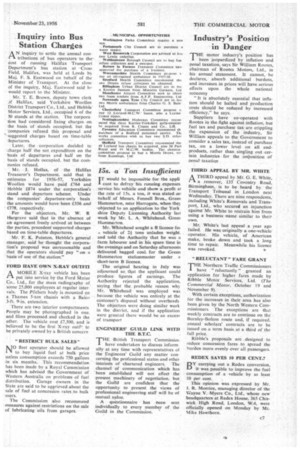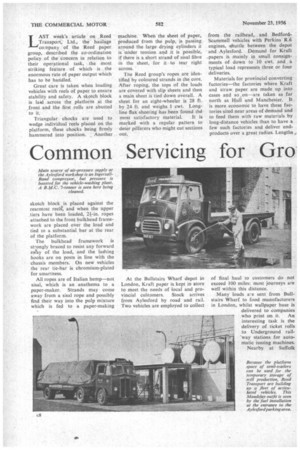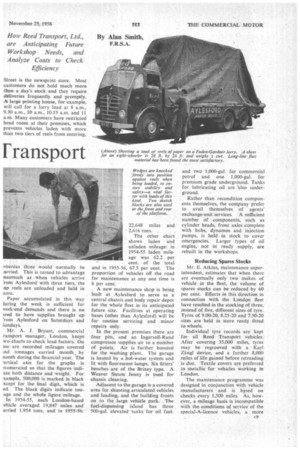Industry's Position in Danger
Page 47

Page 48

Page 49

If you've noticed an error in this article please click here to report it so we can fix it.
motor industry's position has been jeopardized by inflation and penal taxation, says Sir William Rootes, chairman of Rootes Motors, Ltd., in his annual statement. It cannot, he declares, absorb additional burdens, and increases in prices will have serious effects upon the whole national economy "It is absolutely essential that inflation should be halted and production costs should be reduced by increased efficiency." he says.
Suppliers have co-operated with Rootes in the fight against inflation, but fuel tax and purchase tax are crippling the expansion of the industry, Sir William appeals to the Government to consider a sales tax, instead of purchase tax, on a lower level on all endproducts, rather than singling out certain industries for the imPosition of penal' taxatiqn THIRD APPEAL BY MR. WHITE
A THIRD appeal by Mr. G. E. While, In/ a remover, 135 Coventry Road, Birmingham, is to be heard by the Transport Tribunal in London next Wednesday. There are nine respondents, including White's Removals and Transport, Ltd., who secured an injunction against Mr. White to restrain him from using a business name similar to their own.
Mr. White's last appeal a year ago failed. He was originally a one-vehicle operator. His vehicle, of American make, broke down and took a long time to repair. Meanwhile his licence was revoked.
"RELUCTANT" FARE GRANT
THE Northern Traffic Commissioners have " reluctantly " granted an application for higher fares made by Ribble Motor Services, Ltd. (The Commercial Motor, October 19 and November 9).
With certain exceptions, authorization for the increases in their area has also been given by the North Western Commissioners The exceptions are that weekly contracts are to continue on the Burnley-Bolton route and, if required, annual scholars' contracts are to be issued on a term basis at a third of the full price.
Ribble's proposals are designed to reduce concession fares to spread the burden more evenly over all passengers.
REDEX SAVES 10 PER CENT.?
BY carrying out a Redex conversion, it was possible to improve the fuel consumption of a vehicle by at least IO per cent.
This opinion was expressed by Mr. J. R. Morrice, managing director of the Wayne V. Myers Co., Ltd., whose new headquarters at Redex House, 365 Chiswick High Road, London, W.4, were officially opened on Monday by Mr. Mike Hawthorn.
LAST week's article on Reed Transport, Ltd., the haulage company of the Reed paper group, described the co-ordination policy of the concern in relation to their operational task, the most striking feature of which is the enormous rate of paper output which has to be handled.
Great care is taken when loading vehicles with reefs of paper to ensure stability and safety. A skotch block is laid across the platform at the .front and the first rolls are abutted to it.
Triangular chocks are used to wedge individual reels placed on the platform, these chocks being firmly hammered into position. Another machine. When the sheet of paper, produced from the pulp, is passing around the large drying cylinders it is under tension and it is possible., if there is a short strand of sisal fibre in the sheet, for it to tear right across.
'File Reed group's ropes are identified by coloured strands in the core. After roping, the tops of the loads are covered with slip sheets and then a main sheet is tied down overall. A sheet for an eight-wheeler is 28 ft. by 24 ft. and weighs 1 cwt. Longline flax sheeting has been found the most satisfactory material. It is marked with a regular pattern to deter pilferers who might cut sections out.
from the railhead, and BedfordScammell vehicles with Perkins R.6 engines, shuttle between the depot and Aylesford. Demand for Kraft -papers is mainly in small consignments of down to 10 cwt. and a typical load represents three or four deliveries.
Materials for provincial converting factories—the factories where Kraft and straw paper are made up into cases and so ,on—are taken as far north as Hull and Manchester. It is more economic to have these factories sited near areas of demand and to feed them with raw materials by long-distance vehicles than to have a few such factories and deliver endproducts over a great radius. Lengths,
Street is the newsprint store. Most customers do not hold much more than a day's stock and they require deliveries frequently and promptly. A large printing house, for example, will call for a lorry load at 8 a.m., 9.30 a.m., 10 a.m., 10.15 a.m. and 11 a.m. Many customers have restricted head room at their premises, which prevents vehicles laden with more than two tiers of reels from entering,
















































































































